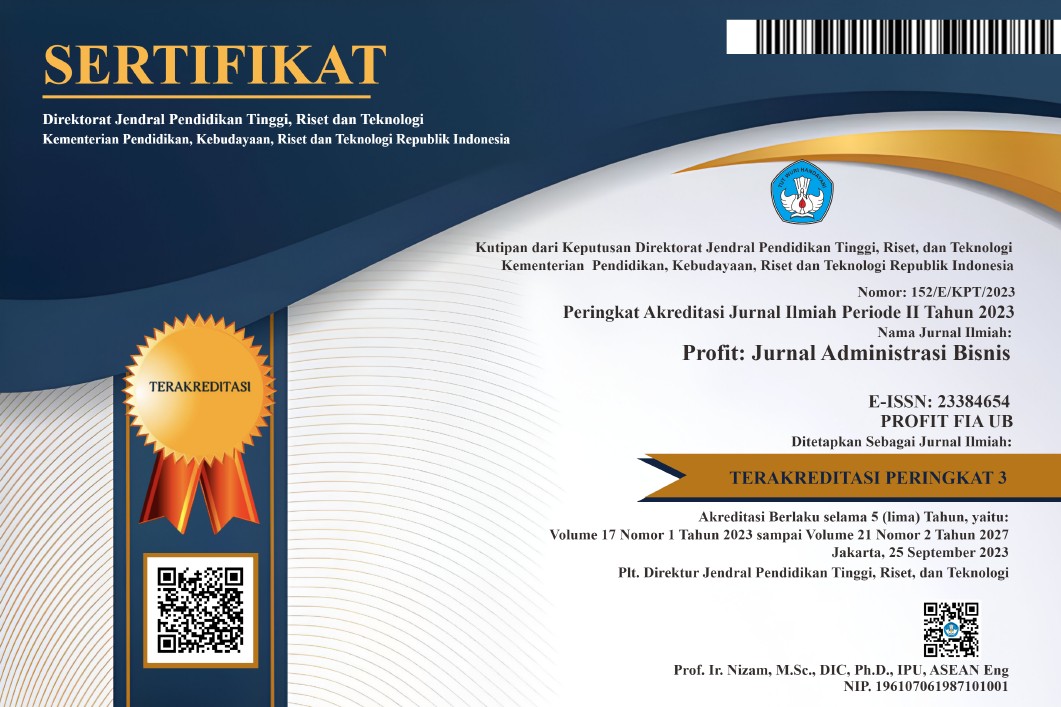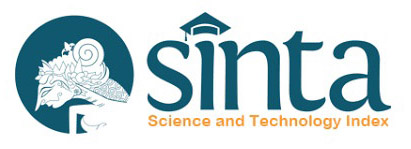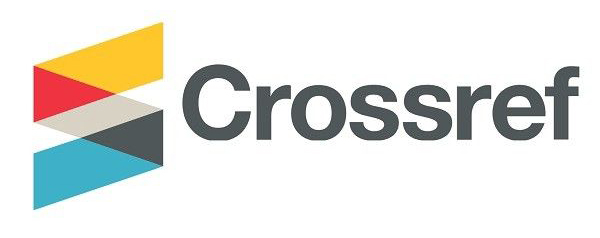FINANCIAL MANAGEMENT BEHAVIOR: HUBUNGAN ANTARA SELF-EFFICACY, SELF-CONTROL, DAN COMPULSIVE BUYING
Keywords:
Financial Management Behavior, Self-efficacy, Self-control, Compulsive BuyingAbstract
The ability to manage finances potentially affect a person's financial condition and psychological condition in the future. This study aims to determine the impact of self-efficacy and self-control on financial management behavior and its impact on compulsive buying behavior. The study was conducted by collecting and analyzing related journals for the research objectives. Based on literature studies conducted, self-efficacy and self-control affect financial management behavior and compulsive buying. The studies also show that self-efficacy influences self-control, increasing the level of self-efficacy in a person can prevent her/him in compulsive actions such as compulsive buying.
References
Achtziger, A., Hubert, M., Kenning, P., Raab, G., & Reisch, L. (2015). Debt Out of Control: The Links Between Self-Control, Compulsive Buying, and Real Debts. Journal of Economic Psychology. https://doi.org/10.1016/j.joep.2015.04.003
Akhadiyah, R. F. (2017). PERILAKU PEMBELIAN KOMPULSIF PRODUK FASHION ( SurveiPadaKonsumen Fashion Malang Town Square Di Kota Malang ). 48(1), 19–27.
Asebedo, S. D., Seay, M. C., Archuleta, K., & Brase, G. (2019). The Psychological Predictors of Older Preretirees’ Financial Self-Efficacy. Journal of Behavioral Finance, 20(2), 127–138. https://doi.org/10.1080/15427560.2018.1492580
Bamforth, J., & Geursen, G. (2017). Categorising the money management behaviour of young consumers. Young Consumers, 18, 0. https://doi.org/10.1108/YC-01-2017-00658
Bamforth, J., Jebarajakirthy, C., & Geursen, G. (2018). Understanding undergraduates’ money management behaviour: a study beyond financial literacy. International Journal of Bank Marketing, 36. https://doi.org/10.1108/IJBM-05-2017-0104
Biljanovska, N., & Palligkinis, S. (2013). Control Thyself: Self-Control Failure and Household Wealth. SSRN Electronic Journal. https://doi.org/10.2139/ssrn.2341701
Chen, X., Li, B., Xie, J., Li, Y., & Guodong, Z. (2018). The Big Five, Self-efficacy, and Self-control in Boxers. https://doi.org/10.1101/361295
Choi, J., Laibson, D., & Madrian, B. (2005). $100 Bills on the Sidewalk: Suboptimal Investment in 401(k) Plans.
Dittmar, H. (2005). A New Look at ?Compulsive Buying?: Self?Discrepancies and Materialistic Values as Predictors of Compulsive Buying Tendency. Journal of Social and Clinical Psychology - J SOC CLIN PSYCHOL, 24, 832–859. https://doi.org/10.1521/jscp.2005.24.6.832
Donnelly, G., Iyer, R., & Howell, R. (2012). The Big Five personality traits, material values, and financial well-being of self-described money managers. Journal of Economic Psychology, 33, 1129–1142. https://doi.org/10.1016/j.joep.2012.08.001
Dwiastanti, A. (2015). Financial Literacy as the Foundation for Individual Financial Behavior. Journal of Education and Practice, 6(33), 99–105. Retrieved from http://www.eric.ed.gov/contentdelivery/servlet/ERICServlet?accno=EJ1083664
Farrell, L., Fry, T., & Risse, L. (2015). The significance of financial self-efficacy in explaining women’s personal finance behaviour. Journal of Economic Psychology. https://doi.org/10.1016/j.joep.2015.07.001
Felicia, F., Elvinawaty, R., & Hartini, S. (n.d.). Kecenderungan Pembelian Kompulsif: Peran Perfeksionisme dan Gaya Hidup Hedonistik. Psikologia: Jurnal Pemikiran Dan Penelitian Psikologi, 9(3).
Helen, D. (2019). Preventing compulsive shopping among young South-Africans and Germans. Young Consumers, 20(1), 29–43. https://doi.org/10.1108/YC-08-2018-0842
Herawati, N., Candiasa, I., Yadnyana, I., & Suharsono, N. (2018). Factors That Influence Financial Behavior Among Accounting Students in Bali. International Journal of Business Administration, 9, 30. https://doi.org/10.5430/ijba.v9n3p30
Herdjiono, I., & Damanik, L. A. (2016). Pengaruh Financial Attitude, Financial Knowledge, Parental Income Terhadap Financial Management. Jurnal Manajemen Teori Dan Terapan Universitas Musamus, 9(3), 226–241.
Horváth, C., Büttner, O., Belei, N., & Adigüzel, F. (2015). Balancing the Balance: Self-Control Mechanisms and Compulsive Buying. Journal of Economic Psychology, 49. https://doi.org/10.1016/j.joep.2015.05.004
Kaur, S. (2018). Compulsive Buying Behaviour in relation to Self Control and Generalized Self Efficacy among Young Professionals. Journal Homepage: International Journal of Research in Social Sciences, 8(3), 2249–2496.
Lajuni, N., Bujang, I., Karia, A. A., & Yacob, Y. (2018). Religiosity, Financial Knowledge, And Financial Behavior Influence On Personal Financial Distress Among Millennial Generation. Jurnal Manajemen Dan Kewirausahaan, 20(2), 92–98.
Lee, S.-H., & Workman, J. (2015). Compulsive buying and branding phenomena. Journal of Open Innovation: Technology, Market, and Complexity, 1. https://doi.org/10.1186/s40852-015-0004-x
Maskhuroh, S., & Renanita, T. (2018). Pembelian Kompulsif Ditinjau dari Kontrol Diri Guru Sekolah Dasar. Jurnal Ilmu Perilaku, 2, 15. https://doi.org/10.25077/jip.2.1.15-24.2018
Moon, M., Rasool, H., & Attiq, S. (2015). Personality and Irregular Buying Behavior: Adaptation and Validation of Core Self Evaluation Personality Trait Model in Consumer Impulsive and Compulsive Buying Behavior. Journal of Marketing and Consumer Research, 15, 121–131.
Omar, N. A. (2014). Compulsive buying and credit card misuse among credit card holders: The roles of self-esteem, materialism, impulsive buying and budget constraint. Intangible Capital, 10, 446.
Ozmete, E., & Hira, T. (2011). Conceptual analysis of behavioral theories/models: Application to financial behavior. European Journal of Social Sciences, 18, 386–404.
Palan, K. M., Morrow, P. C., Trapp, A., & Blackburn, V. (2011). Compulsive Buying Behavior in College Students: The Mediating Role of Credit Card Misuse. Journal of Marketing Theory and Practice, 19(1), 81–96. https://doi.org/10.2753/MTP1069-6679190105
Pandey, S. (2016). The Effect of Deals and Moods on Compulsive Buying: A Study on Young Indian Consumers. Global Business Review, 17. https://doi.org/10.1177/0972150915619821
Pham, T., Yap, K., & Dowling, N. (2012). The impact of financial management practices and financial attitudes on the relationship between materialism and compulsive buying. Journal of Economic Psychology, 33, 565–573. https://doi.org/10.1016/j.joep.2011.12.007
Putri, N. M. D. R., & Rahyuda, H. (2017). Pengaruh Tingkat Financial Literacy dan Faktor Sosiodemografi terhadap Perilaku Keputusan Investasi Individu. E-Jurnal Ekonomi Dan Bisnis Universitas Udayana, 6(9), 3407–3434.
Singh, R., & Nayak, J. (2016). Effect of family environment on adolescent compulsive buying: mediating role of self-esteem. Asia Pacific Journal of Marketing and Logistics, 28, 396–419. https://doi.org/10.1108/APJML-05-2015-0082
Strömbäck, C., Lind, T., Skagerlund, K., Västfjäll, D., & Tinghög, G. (2017). Does self-control predict financial behavior and financial well-being? Journal of Behavioral and Experimental Finance, 14. https://doi.org/10.1016/j.jbef.2017.04.002
Weinstein, A., Maraz, A., Griffiths, M., Lejoyeux, M., & Demetrovics, Z. (2016). Compulsive Buying—Features and Characteristics of Addiction. https://doi.org/10.1016/B978-0-12-800634-4.00098-6
Downloads
Published
Issue
Section
License
The copyright of the received article shall be assigned to the journal as the publisher of the journal. The intended copyright includes the right to publish the article in various forms (including reprints). The journal maintains the publishing rights to the published articles.

This work is licensed under a
Creative Commons Attribution-NonCommercial 4.0 International License
















